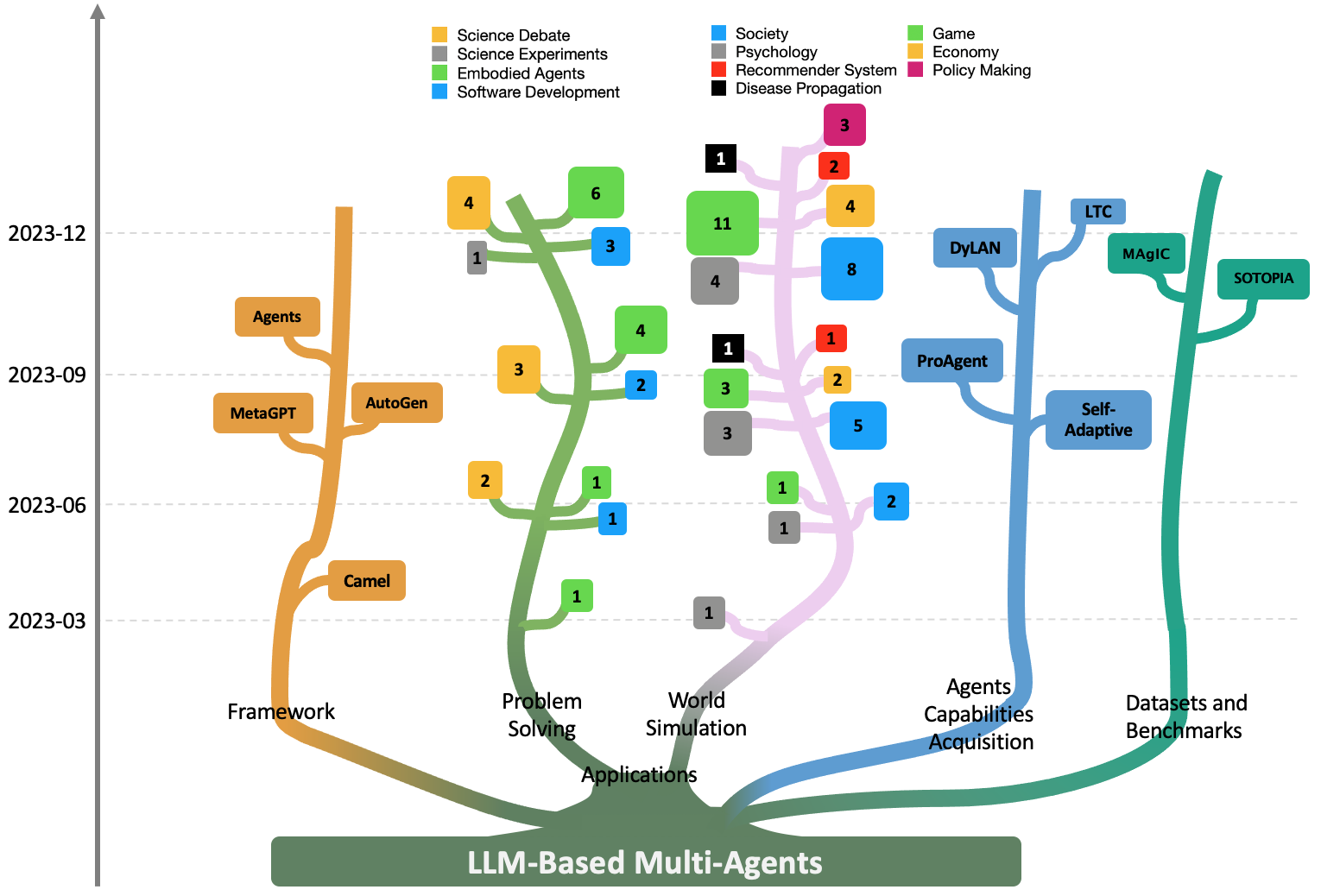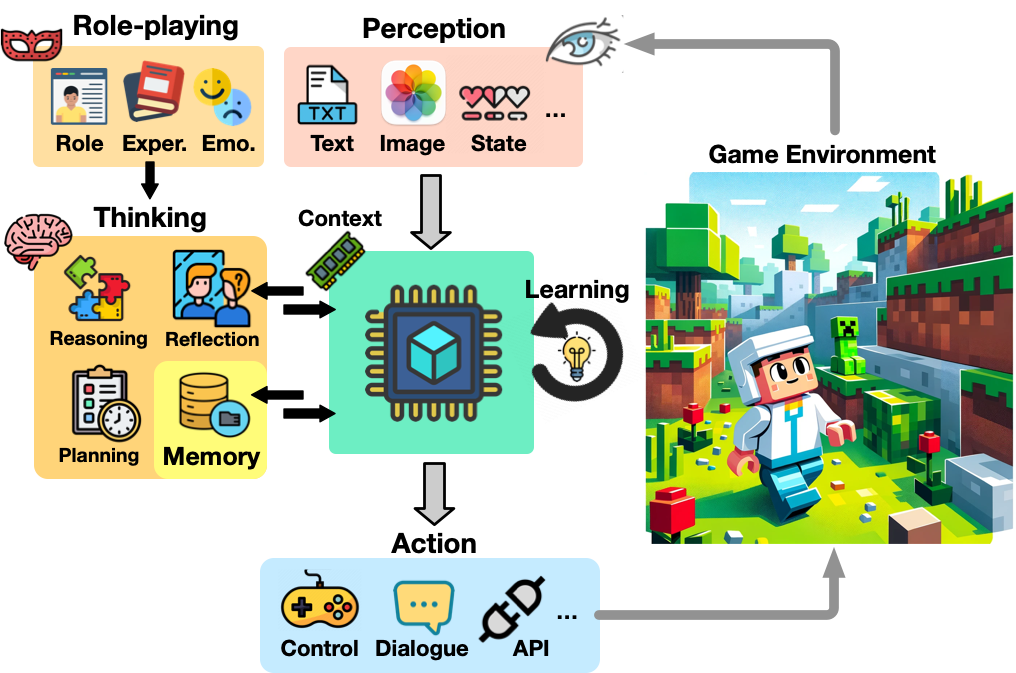A Survey on Large Language Model based Autonomous Agents
2308.11432

0
1
💬
Abstract
Autonomous agents have long been a prominent research focus in both academic and industry communities. Previous research in this field often focuses on training agents with limited knowledge within isolated environments, which diverges significantly from human learning processes, and thus makes the agents hard to achieve human-like decisions. Recently, through the acquisition of vast amounts of web knowledge, large language models (LLMs) have demonstrated remarkable potential in achieving human-level intelligence. This has sparked an upsurge in studies investigating LLM-based autonomous agents. In this paper, we present a comprehensive survey of these studies, delivering a systematic review of the field of LLM-based autonomous agents from a holistic perspective. More specifically, we first discuss the construction of LLM-based autonomous agents, for which we propose a unified framework that encompasses a majority of the previous work. Then, we present a comprehensive overview of the diverse applications of LLM-based autonomous agents in the fields of social science, natural science, and engineering. Finally, we delve into the evaluation strategies commonly used for LLM-based autonomous agents. Based on the previous studies, we also present several challenges and future directions in this field. To keep track of this field and continuously update our survey, we maintain a repository of relevant references at https://github.com/Paitesanshi/LLM-Agent-Survey.
Get summaries of the top AI research delivered straight to your inbox:
Overview
- This paper presents a comprehensive survey of research on autonomous agents based on large language models (LLMs).
- The paper discusses the construction of LLM-based autonomous agents, the diverse applications of these agents, and the evaluation strategies used.
- The paper also highlights challenges and future directions in this field of research.
Plain English Explanation
Autonomous agents, or computer programs that can make decisions and take actions on their own, have been a focus of research for a long time. However, previous research often trained these agents in limited environments, which made it difficult for them to make decisions similar to how humans learn and think.
Recently, the development of large language models has shown great potential for achieving human-level intelligence. This has led to an increase in studies investigating the use of these large language models to create autonomous agents.
This paper provides a thorough review of this research, covering how these LLM-based autonomous agents are built, the various ways they are being used (such as in social science, natural science, and engineering), and the strategies used to evaluate them.
The paper also identifies challenges and suggests future directions for this field of research, which could lead to the development of more capable and human-like autonomous agents. To help keep track of the latest advancements, the authors maintain a repository of relevant references.
Technical Explanation
The paper proposes a unified framework that encompasses the construction of most LLM-based autonomous agents. This framework includes components like the LLM, knowledge acquisition, task-specific fine-tuning, and decision-making.
The survey then covers a wide range of applications for these LLM-based agents, such as solving chemical problems, enhancing education, and playing complex games. The evaluation strategies discussed include measuring task performance, reasoning behavior, and alignment with human values.
Based on the reviewed literature, the paper highlights several challenges, including the need for better evaluation frameworks to assess the agents' decision-making processes, the difficulty of scaling these agents to more complex tasks, and the potential risks of deploying them in real-world settings.
Critical Analysis
The paper provides a comprehensive overview of the field, but it acknowledges that the research is still in its early stages. The authors note that more work is needed to develop robust evaluation frameworks that can accurately assess the agents' reasoning abilities and decision-making processes.
Additionally, the paper does not delve deeply into the potential ethical and societal implications of deploying these LLM-based autonomous agents, which could be an important area for future research to explore.
While the paper highlights the impressive capabilities of these agents, it is crucial to consider the limitations and potential risks, such as the agents' reliance on the biases and limitations of the training data, and the challenge of ensuring their alignment with human values and interests.
Conclusion
This paper provides a comprehensive survey of the emerging field of LLM-based autonomous agents, covering their construction, diverse applications, and evaluation strategies. The research in this area has shown significant potential, but there are still many challenges that need to be addressed.
As the development of these agents continues, it will be important to carefully consider the ethical and societal implications, and to develop robust evaluation frameworks that can truly assess the agents' decision-making capabilities and alignment with human values. Continued research and thoughtful deployment of these technologies could lead to significant advancements in various domains, but must be done with great care and consideration.
Related Papers

Exploring Autonomous Agents through the Lens of Large Language Models: A Review
Saikat Barua

0
0
Large Language Models (LLMs) are transforming artificial intelligence, enabling autonomous agents to perform diverse tasks across various domains. These agents, proficient in human-like text comprehension and generation, have the potential to revolutionize sectors from customer service to healthcare. However, they face challenges such as multimodality, human value alignment, hallucinations, and evaluation. Techniques like prompting, reasoning, tool utilization, and in-context learning are being explored to enhance their capabilities. Evaluation platforms like AgentBench, WebArena, and ToolLLM provide robust methods for assessing these agents in complex scenarios. These advancements are leading to the development of more resilient and capable autonomous agents, anticipated to become integral in our digital lives, assisting in tasks from email responses to disease diagnosis. The future of AI, with LLMs at the forefront, is promising.
4/9/2024

Large Language Model based Multi-Agents: A Survey of Progress and Challenges
Taicheng Guo, Xiuying Chen, Yaqi Wang, Ruidi Chang, Shichao Pei, Nitesh V. Chawla, Olaf Wiest, Xiangliang Zhang

0
0
Large Language Models (LLMs) have achieved remarkable success across a wide array of tasks. Due to the impressive planning and reasoning abilities of LLMs, they have been used as autonomous agents to do many tasks automatically. Recently, based on the development of using one LLM as a single planning or decision-making agent, LLM-based multi-agent systems have achieved considerable progress in complex problem-solving and world simulation. To provide the community with an overview of this dynamic field, we present this survey to offer an in-depth discussion on the essential aspects of multi-agent systems based on LLMs, as well as the challenges. Our goal is for readers to gain substantial insights on the following questions: What domains and environments do LLM-based multi-agents simulate? How are these agents profiled and how do they communicate? What mechanisms contribute to the growth of agents' capacities? For those interested in delving into this field of study, we also summarize the commonly used datasets or benchmarks for them to have convenient access. To keep researchers updated on the latest studies, we maintain an open-source GitHub repository, dedicated to outlining the research on LLM-based multi-agent systems.
4/22/2024

A Survey on Large Language Model-Based Game Agents
Sihao Hu, Tiansheng Huang, Fatih Ilhan, Selim Tekin, Gaowen Liu, Ramana Kompella, Ling Liu

0
0
The development of game agents holds a critical role in advancing towards Artificial General Intelligence (AGI). The progress of LLMs and their multimodal counterparts (MLLMs) offers an unprecedented opportunity to evolve and empower game agents with human-like decision-making capabilities in complex computer game environments. This paper provides a comprehensive overview of LLM-based game agents from a holistic viewpoint. First, we introduce the conceptual architecture of LLM-based game agents, centered around six essential functional components: perception, memory, thinking, role-playing, action, and learning. Second, we survey existing representative LLM-based game agents documented in the literature with respect to methodologies and adaptation agility across six genres of games, including adventure, communication, competition, cooperation, simulation, and crafting & exploration games. Finally, we present an outlook of future research and development directions in this burgeoning field. A curated list of relevant papers is maintained and made accessible at: https://github.com/git-disl/awesome-LLM-game-agent-papers.
4/3/2024

Large Language Models for Education: A Survey and Outlook
Shen Wang, Tianlong Xu, Hang Li, Chaoli Zhang, Joleen Liang, Jiliang Tang, Philip S. Yu, Qingsong Wen

0
0
The advent of Large Language Models (LLMs) has brought in a new era of possibilities in the realm of education. This survey paper summarizes the various technologies of LLMs in educational settings from multifaceted perspectives, encompassing student and teacher assistance, adaptive learning, and commercial tools. We systematically review the technological advancements in each perspective, organize related datasets and benchmarks, and identify the risks and challenges associated with deploying LLMs in education. Furthermore, we outline future research opportunities, highlighting the potential promising directions. Our survey aims to provide a comprehensive technological picture for educators, researchers, and policymakers to harness the power of LLMs to revolutionize educational practices and foster a more effective personalized learning environment.
4/3/2024